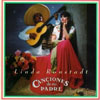LINDA RONSTADT : CANCIONES DE MI PADRE
- Por Un Amor
- Los Laureles
- Hay Unos Ojos
- La Cigarra
- Tú Solo Tú
- Y Andale
- Rogaciano El Huapanguero
- La Charreada
- Dos Arbolitos
- Corrido DeCanenea
- La Barca De Guaymas
- La Calandria
- El Sol Que Tú Eres
Label : Asylum
Release Year : 1987
Length : 39:27
Review (AllMusic) : Linda Ronstadt abandoned the pop audience in 1983, turning toward traditional pop music. She recorded three albums with Nelson Riddle before changing direction yet again, this time recording a set of traditional Mexican songs titled Canciones de Mi Padre. As the title suggests, the record is a fairly sentimental collection, since these are songs from her childhood and her heritage. Occasionally, Ronstadt oversells the songs but overall, the album is charming, affectionate, entertaining, and more successful than her stilted Nelson Riddle collaborations.
Review (Wikipedia) : Canciones De Mi Padre (Spanish for "Songs Of My Father," or "My Father's Songs") was American singer/songwriter/producer Linda Ronstadt's first album of Mexican traditional Mariachi music. The album was released in late 1987 and quickly became a smash hit. It stands as the biggest selling non-English language album in American record history. The album has been RIAA certified Double-Platinum (for over 2 million US copies sold) and also won Ronstadt the Grammy Award for Best Mexican/Mexican-American Album at the 31st Grammy Awards. These canciones were a big part of Ronstadt's family tradition and musical roots. The title Canciones De Mi Padre refers to a booklet that the University of Arizona published in 1946 by Ronstadt's aunt, Luisa Espinel who had been an international singer in the 1920s. The songs come from Sonora and Ronstadt included her favorites on the album. Also, Ronstadt has credited Mexican singer Lola Beltran as an influence in her own singing style, and she recalls how a frequent guest to the Ronstadt home, Eduardo "Lalo" Guerrero, father of Chicano music, would often serenade her as child with these songs. In the accompanying printed material, each song's Spanish lyrics were paired with an English translation and a discussion of the song's background or its significance for Ronstadt (omitted on the CD). Rubén Fuentes served as musical director/bandleader. Follow-up albums include Mas Canciones, Frenesí, and the Rhino Records compilation Mi Jardin Azul: Las Canciones Favoritas, which collects songs from the previous three Spanish-language albums.
